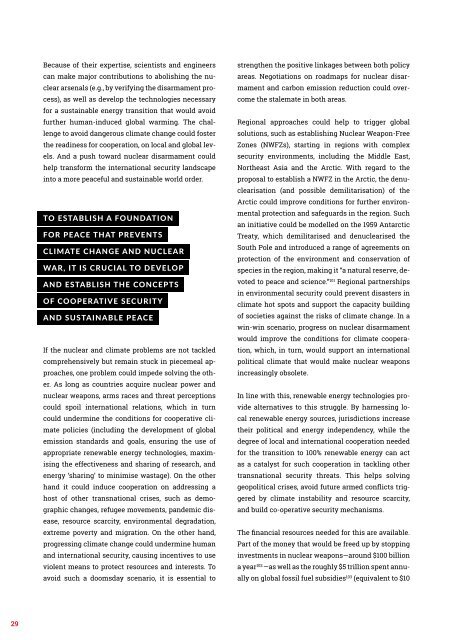THE CLIMATE-NUCLEAR NEXUS
1ThUv98
1ThUv98
You also want an ePaper? Increase the reach of your titles
YUMPU automatically turns print PDFs into web optimized ePapers that Google loves.
Because of their expertise, scientists and engineers<br />
can make major contributions to abolishing the nuclear<br />
arsenals (e.g., by verifying the disarmament process),<br />
as well as develop the technologies necessary<br />
for a sustainable energy transition that would avoid<br />
further human-induced global warming. The challenge<br />
to avoid dangerous climate change could foster<br />
the readiness for cooperation, on local and global levels.<br />
And a push toward nuclear disarmament could<br />
help transform the international security landscape<br />
into a more peaceful and sustainable world order.<br />
TO ESTABLISH A FOUNDATION<br />
FOR PEACE THAT PREVENTS<br />
<strong>CLIMATE</strong> CHANGE AND <strong>NUCLEAR</strong><br />
WAR, IT IS CRUCIAL TO DEVELOP<br />
AND ESTABLISH <strong>THE</strong> CONCEPTS<br />
OF COOPERATIVE SECURITY<br />
AND SUSTAINABLE PEACE<br />
If the nuclear and climate problems are not tackled<br />
comprehensively but remain stuck in piecemeal approaches,<br />
one problem could impede solving the other.<br />
As long as countries acquire nuclear power and<br />
nuclear weapons, arms races and threat perceptions<br />
could spoil international relations, which in turn<br />
could undermine the conditions for cooperative climate<br />
policies (including the development of global<br />
emission standards and goals, ensuring the use of<br />
appropriate renewable energy technologies, maximising<br />
the effectiveness and sharing of research, and<br />
energy ‘sharing’ to minimise wastage). On the other<br />
hand it could induce cooperation on addressing a<br />
host of other transnational crises, such as demographic<br />
changes, refugee movements, pandemic disease,<br />
resource scarcity, environmental degradation,<br />
extreme poverty and migration. On the other hand,<br />
progressing climate change could undermine human<br />
and international security, causing incentives to use<br />
violent means to protect resources and interests. To<br />
avoid such a doomsday scenario, it is essential to<br />
strengthen the positive linkages between both policy<br />
areas. Negotiations on roadmaps for nuclear disarmament<br />
and carbon emission reduction could overcome<br />
the stalemate in both areas.<br />
Regional approaches could help to trigger global<br />
solutions, such as establishing Nuclear Weapon-Free<br />
Zones (NWFZs), starting in regions with complex<br />
security environments, including the Middle East,<br />
Northeast Asia and the Arctic. With regard to the<br />
proposal to establish a NWFZ in the Arctic, the denuclearisation<br />
(and possible demilitarisation) of the<br />
Arctic could improve conditions for further environmental<br />
protection and safeguards in the region. Such<br />
an initiative could be modelled on the 1959 Antarctic<br />
Treaty, which demilitarised and denuclearised the<br />
South Pole and introduced a range of agreements on<br />
protection of the environment and conservation of<br />
species in the region, making it “a natural reserve, devoted<br />
to peace and science.” 101 Regional partnerships<br />
in environmental security could prevent disasters in<br />
climate hot spots and support the capacity building<br />
of societies against the risks of climate change. In a<br />
win-win scenario, progress on nuclear disarmament<br />
would improve the conditions for climate cooperation,<br />
which, in turn, would support an international<br />
political climate that would make nuclear weapons<br />
increasingly obsolete.<br />
In line with this, renewable energy technologies provide<br />
alternatives to this struggle. By harnessing local<br />
renewable energy sources, jurisdictions increase<br />
their political and energy independency, while the<br />
degree of local and international cooperation needed<br />
for the transition to 100% renewable energy can act<br />
as a catalyst for such cooperation in tackling other<br />
transnational security threats. This helps solving<br />
geopolitical crises, avoid future armed conflicts triggered<br />
by climate instability and resource scarcity,<br />
and build co-operative security mechanisms.<br />
The financial resources needed for this are available.<br />
Part of the money that would be freed up by stopping<br />
investments in nuclear weapons—around $100 billion<br />
a year 102 —as well as the roughly $5 trillion spent annually<br />
on global fossil fuel subsidies 103 (equivalent to $10<br />
29


